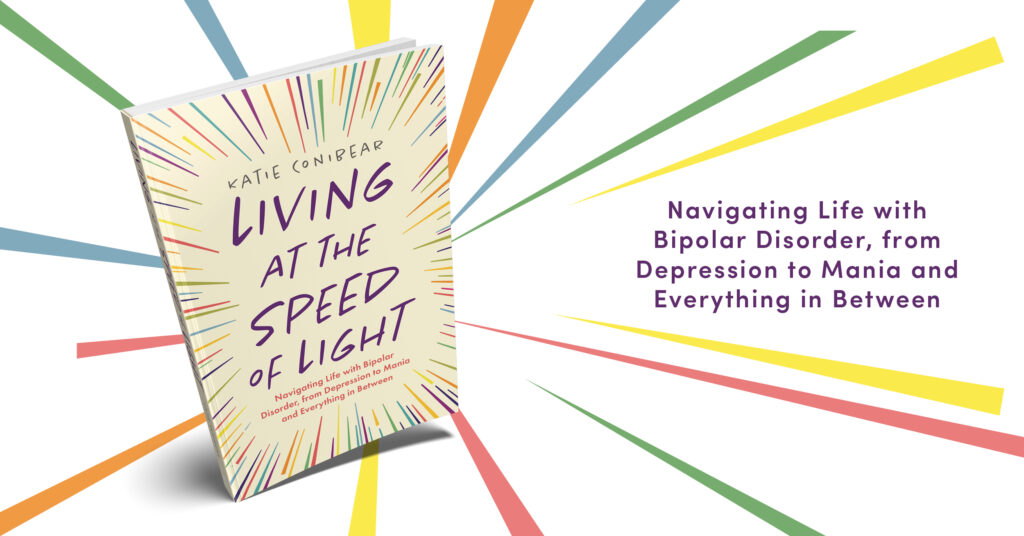Q&A with Katie Conibear: Living with Bipolar Disorder and Learning What Works

Katie Conibear, author of the honest but hopeful guide, Living at the Speed of Light, shares their lived experience of bipolar disorder, from personal encounters of stigma to hobbies that help maintain stability, advice for loved ones, and more.
Reflecting on what you now know about living with bipolar disorder, if you could speak to your younger self on the day of your diagnosis what would you say?
I remember being angry and overwhelmed that day, but I also felt some relief that I finally had an answer to why life had been so difficult. I would tell my younger self to be patient. There isn’t a magical cure, and it takes commitment and effort to manage bipolar disorder. A diagnosis is only the beginning of the journey of understanding bipolar, discovering what works and what doesn’t and finding long term stability.
What misconceptions about bipolar disorder have you personally encountered?
I’ve heard a few! The two I hear most often are, “Mania must be so fun!”
Mania doesn’t always feel good. You’re not always ecstatic and the life of the party. It can be as self-destructive and life threatening as depression. It’s happiness but brighter, louder, so much so it’s like your senses are overloaded. It can be irritating and unpleasant; I’ve had delusions that I was invincible and all-powerful that cars would instantly stop if I walked into the road. I’ll feel like raging and screaming because of the pressure building inside my head, but there’s no release valve. It’s not anything like ‘fun.’
“You can’t have bipolar; you seem so nice!”
I’m always confused by this one. Having Bipolar is not a character flaw. Just because I suffer from intense mood swings, it does not make me bad. I’m not going to attack you or go on some rampage suddenly. I find people who suffer from bipolar have tremendous empathy for others and are willing to support friends and family even when struggling. Mental illness for the vast majority of us doesn’t work like that.
In ‘Living at the Speed of Light,’ you write about the importance of hobbies and interests for stability, which ones have helped you the most?
I think it’s essential to have an identity beyond bipolar – it becomes a significant part of your everyday life, so it can become difficult to see beyond it, and that’s where hobbies and interests have helped me. I love music and regularly attend gigs (something I’ve missed desperately during the pandemic), and I also play the drums. I was a drummer in a genuinely terrible band in my teens and early twenties! Music has always been an outlet for me, and a session on the drum kit helps me work though difficult emotions. I love to read and attend a monthly book club, which has been a great way to connect with like-minded people.
What was the most challenging aspect of writing this book? And what was the most empowering aspect?
Anyone who writes, journals, or talks about their mental illness on social media knows it’s draining. After a day spent writing about my experiences for the book and sharing my insights and advice, I was emotionally exhausted. Writing about my specific experiences of depression and psychosis were extremely challenging. I had to look after myself and talk it through with people close to me, like my partner.
The empowering aspect was finishing it! A recurring element of my bipolar episodes is beginning a creative project, going all in but never finishing it. This time, I made it happen, and it was incredible to see how much I’ve learned since my diagnosis in 2012.
What does the title ‘Living at the Speed of Light’ mean to you?
Initially, it was just the title for the mania and hypomania chapter, but I felt it encapsulates how it feels to live with bipolar disorder. Often life will feel out of control, and you’re hurtling through each day without a plan. Periods of depression, hypomania or mania always seem to catch up with you, and these extreme mood changes can feel like they’re ruling your life.
What advice would you give to someone supporting a loved one who has recently been diagnosed with bipolar disorder?
Learn their triggers and warning signs.
Let them share their experience with you.
Learn more about bipolar disorder.
Make a plan for when they’re in crisis and help them create a healthy routine.
Talk through their challenging behaviour and how it affects you.
Lastly, it’s ok to find it difficult! It’s ok to be angry with them if they’re offensive and rude during a manic episode. It’s ok to be upset and frustrated when they’re depressed. Make sure you take care of yourself, so you’re in a better place to support them.